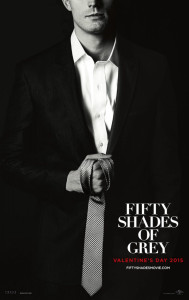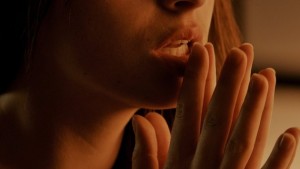Fifty Shades of Grey – Review
By David Baldwin
I am by no means the target audience for Fifty Shades of Grey, but I was just as curious as everyone else when the film was first announced. This may have been due to the baffling initial casting of Sons of Anarchy‘s Charlie Hunnam, but mostly because of everything I had heard and read about E.L. James’ massively popular book series. Sadly Hunnam dropped out, but my interest remained piqued for the Twilight-inspired saga.
Anastasia Steele (Dakota Johnson) is an English literature undergrad on the cusp of graduation. Her roommate is sick, so she offers to sub in to interview billionaire Christian Grey (Jamie Dornan) for the school paper. Despite their awkward first encounter, there is an immediate connection between the pair. After a few more not-so casual meetings, they quickly realize their mutual attraction. Anastasia wants a normal relationship, but Christian is interested in something a bit more kinky.
The plot of Fifty Shades of Grey sounds ridiculous on paper, and as it unfolds on screen, it becomes downright ludicrous. Director Sam Taylor-Johnson and writer Kelly Marcel (both working on only their second feature film) wisely play into how silly and chaotic it all quickly becomes, but elevate the film above its smutty origins. They do away with a number of elements from the book and keep the film focused from the very beginning on the unusual relationship between Anastasia and Christian — to the point that their initial first meeting happens with the first five minutes of the film. It propels the film forward and keeps us invested, very rarely deviating. It is so inherently focused on these two characters that nearly every supporting character comes off as one-dimensional and near useless. Hell, the majority of them have less than a dozen lines in the entire film.
Taylor-Johnson and Marcel struggle with the proper tone for the film in many instances (jumping liberally between camp, romance and melodrama), but the pair manage to mold a film that only bears a passing resemblance to Twilight fan fiction. I could go on about the absurd and often preposterous dialogue or the film’s strange structure, but feel both of those elements stay relatively close to what I know of the novel’s framework. Taylor-Johnson and Marcel make it all seem tolerable, and deserve to be commended for that alone.
What they fail to do however is break any new ground when it comes to the film’s sex scenes. They were controversial even before the film went into production, but each one feels surprisingly more tame than the next. The book’s passages were graphic and descriptive; these scenes are simple and practically sterile. The book series is known for its sexual content, but outside of glorifying spanking and slow motion whipping, there is nothing absolutely nothing new or unique here. Some of the scenes are cut so quickly that you can barely register what Anastasia or Christian are even doing. Other scenes merely hint with extreme close-ups. One crucial scene near the end of the film fails entirely because it is shot with a horrifically wide lens. I would not be surprised at all to hear of the studio forcing material to be cut, but what is here may be disappointing to those venturing in strictly based on hype.
While I thought very little of her casting at the time, Johnson is a revelation as Anastasia. She is absolutely perfect in the virginal role, showing off just the right amount of curiosity, confusion and innocence to really sell the character — even when her dialogue becomes absolutely asinine. You feel her every emotion, and the film takes great delight hinging its every move on her reactions. Where the film fails at much of its eroticism, she revels in it. Even when she bites her lip Bella Swan-style, Johnson never once comes off as anything but genuine. This is a star-making role for the young actress, and I can only hope her creative efforts are just as strong in her next project.
I sadly cannot say the same for Dornan. He struggles through the whole film in his attempts to convincingly play an impulsive, controlling and tormented character. But his intensity and charisma come off as laughable. He seems to be putting more effort and intensity into his second-rate American accent than into his performance. He has a bit of chemistry with Johnson, but it feels forced. The dominant force he is supposed to be seems more scared and confused than anything else. Making the character so frustratingly mysterious does Dornan no favours either, merely proving he is totally miscast in the role. He looks good in and (yes ladies) out of a suit, but that is about it.
Fifty Shades of Grey is not nearly as bad a film as I had initially imagined. It is certainly packed with interesting ideas, and I cannot say I loathed the story all that much — even if it was even worse than a Marvel movie with its hints and questions to be answered in the sequels. The sexual violence is a bit icky based on the political climate, but the film never overly glamourizes the subject matter. Johnson was an amazing choice for the lead, delivering a searingly well done performance. But Dornan is wrong from the very start, falling just as flat as the tame sex scenes.
6/10.

